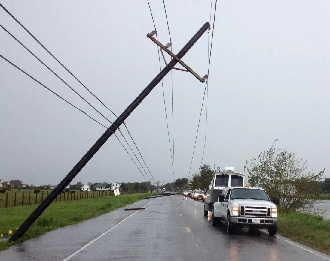My son and I happened to be at Target this afternoon, just in time for #TargetDown, also known as Targetgeddon. We weren’t actually buying anything–we were waiting outside the Minute Clinic for my son’s physical for summer camp. Suddenly, the lights in all of the checkout lanes started flashing in unison, and all of the cash registers went off line. The company suddenly ground to a halt. Customers, who were ready to give the store tens of thousands of dollars instead milled around the checkout lines. My son pointed out, maybe correctly, that it was a cyber attack.
No riots broke out, and everyone seemed to take the event in stride. But it was striking that even the smallest of transactions became impossible. There’s no provision in place to take money from customers without the computer functioning. According to news accounts, the outage was worldwide, meaning that the same scene was repeated in all other stores. Some stores apparently resorted to simply locking up and calling it a day on a busy Saturday.
It hasn’t always been this way. Back in an earlier lifetime, I managed a Radio Shack store. One day, as sometimes happens, the power went out. I knew that I had things in the store that people would want, so I took advantage of the situation. I put some flashlights in the window so that people could see some light emanating from the store. I moved other items, such as flashlights, batteries, and portable radios close to the counter. Within minutes, people started coming in with money to buy these things. I had record sales that evening.

Credit card imprinter. Amazon photo.
I wrote up the sales on paper receipts, and if they paid cash, I put it in the till. If they didn’t have any cash, I took a check and put it in the till. And even if they had a credit card, I could still run it through the trusty credit card imprinter (affectionately known as a “knuckle buster” and still available on Amazon) and process it normally. At the end of the night, I filled out a paper deposit ticket, and dropped the deposit in the bank’s night drop. The credit card receipts went in an envelope and were dropped in the mailbox.
In the event of an emergency, Target has a lot of things that people will need. In addition to flashlights and batteries, they also have food. But if the power is out or the computers are down, they have absolutely no method in place for selling it.
When I kept the store open despite the power being out, I really didn’t think much of it. I’ve always thought of things like electricity and computers as luxuries. But at some point, many people started to rely upon them as necessities. I first realized this when I heard many people assume that it was impossible to make coffee without electricity. (This is not true, as I’ve documented at my How to Make Coffee Without Electricity page.)
But it’s more troubling when people needlessly turn them into necessities. With just a bit of advanced planning, a retailer could continue, at the very least, to take cash for purchases. Waffle House, for example, is famous for remaining open in the wake of emergencies. In the process, they provide a vital service to the public, and also make a profit for themselves, a win-win situation, it seems to me. As I saw today, that attitude is all too rare today in American business.



